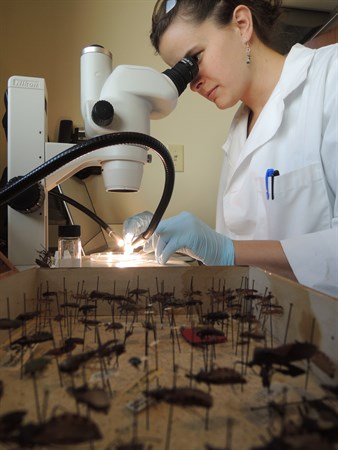 |
Rachel Curtis at Texas A&M University studies
Chagas disease eco-epidemiology.
. |
One of the odder, and a little scary, pests that occasionally enter homes in Texas is the kissing bug, Triatoma species. Kissing bugs aren't very good kissers, but they get their name from their habit of biting sleeping humans on the face at night. Even worse, the "kiss" of the kissing bug can sometimes bring with it a parasite,
Trypanosoma cruzi, that causes
Chagas' disease.
If you are a blood donor you may have heard of Chagas' disease. It's one of those mysterious illnesses you get asked about before you give blood. Thankfully, it's not thought to be common in the U.S., but is a very prevalent in some parts of Central and South America. Recently there has been growing concern that Chagas' disease may be becoming more common in the U.S., and that it's occurrence might be underestimated.
A
research team at Texas A&M University is beginning to study the different kissing bugs in Texas. They hope to learn more about where kissing bugs are active, where different species are found, what hosts they prefer, and how often the parasite infects the bugs.
 |
| Triatoma kissing bug are 1/2 to one inch-long. |
If you come across a kissing bug, the Hamer Labs team would be interested in getting samples. It's important not to touch the kissing bug (they could be carrying germs and they can bite), but scoop it up in a small container or plastic bag. If the bug is collected in a client's home, advise them to clean any surfaces that the bug may have crawled on with a disinfectant cleaner. If you find a kissing bug and want to donate it to the project, they ask that you first contact them via the email address
kissingbug@cvm.tamu.edu. They will provide you with specifics on how and where to send.
For a brochure about the project, go to
http://vetmed.tamu.edu/media/513063/kissing%20bug%20brochure.pdf


2 comments:
It seems this subject doesn't maintain the attention it deserves. I had read where there were studies of Chagas drawn from road kills in Texas but that was years ago. Best of luck with the studies.
I had a note from Dr. Hamer this afternoon who said, "...We have received at least a couple of contacts since you blogged. We are doing some collections of these bugs ourselves but as you probably know, collecting kissing bugs can be challenging. Fortunately, the citizen-submission program has worked quite well and we have over 300 individual bugs of several species that have arrived from different areas in TX and elsewhere...
"We have an REU student on board this summer to help Rachel and they are doing the bug dissections, DNA extractions, kissing bug molecular ID, T. cruzi molecular ID and strain-typing, and blood meal analysis if they contain blood."
Post a Comment